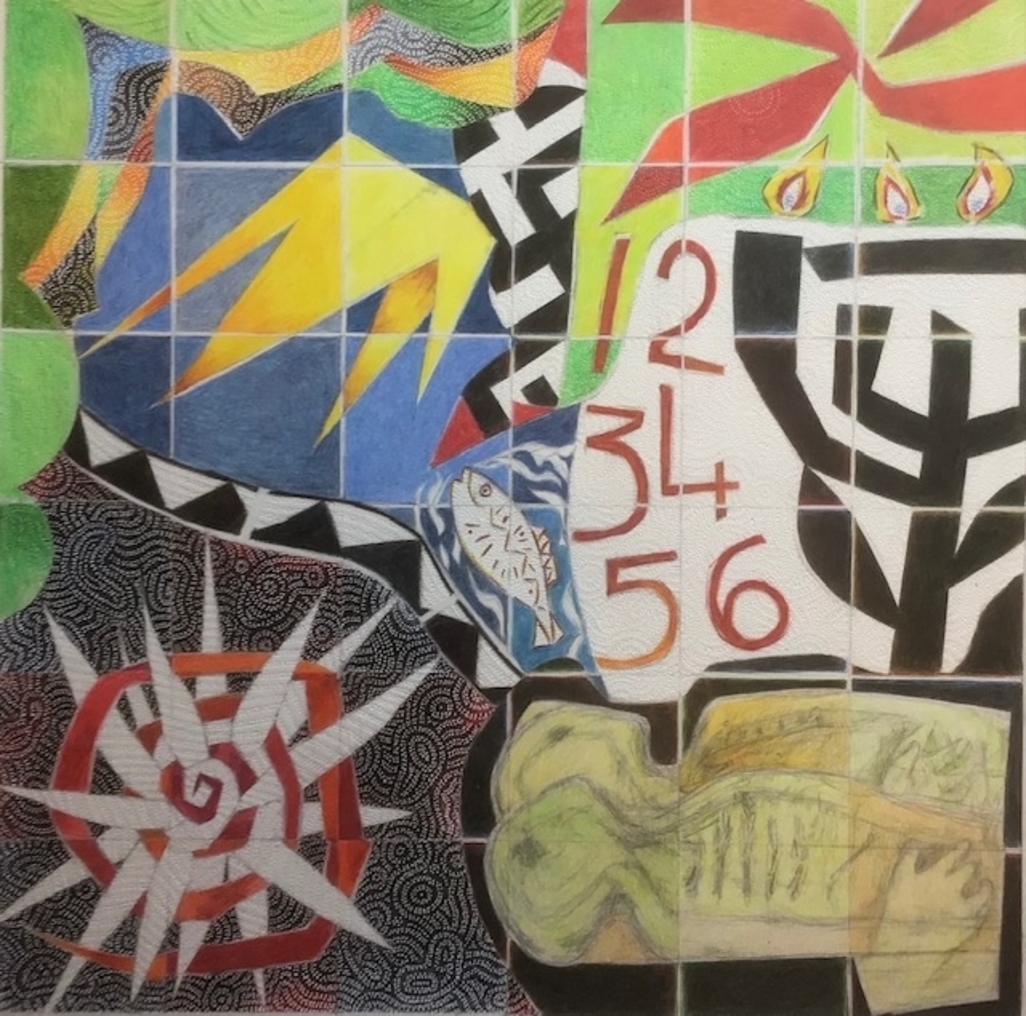McMullen, Philip - VM - Philip McMullen
Philip McMullen: Until

Evil
by Philip McMullen
In theological college we spent a term studying the rise of the Third Reich. Clearly this involved the history of the holocaust and the often-vapid responses of many of the German churches. This was accompanied by the more positive history of the confessing church and the person of Dietrich Bonhoeffer. The purpose was to raise hard theological questions about abject evil. The hardest question has been raised many times – where was God while these horrors were being perpetrated? Lent offers a time for considering theodicy, not in the abstract but in the brutal realities.
The drawing Until is based on a clear grid form. This is of course a straightforward method for organising any drawing. Yet the grids started in my pictures a few years ago signifying ‘days’, as in a calendar. Each square bares its own weight, and contributes, often as fragment, to the whole picture. This seemed suitable for a subject that has few closures.
The swastika is in the upper centre as if partially hid by a curtain (or perhaps printed on the curtain). It is such a powerful and dominating bombastic symbol that it could not be fully revealed lest it drain the rest of the picture of its meanings. To its right a blackened plant almost mutates into an inchoate menorah. The flames seen above this image are echoes of the Menorah, Christian liturgical candles, the Holy Spirit and the gas chambers. A strange and disturbing thought.
The numbers were copied from tattoos that were forcibly given to many Jews. I wrote them in linear sequence to represent every person who was dehumanised in this way. Relating to this I often think of the dehumanising of Jesus by mockery and torture before the crucifixion. It is psychologically easier to kill if you have already crushed the unique, the imago dei, by ritual humiliation.
On the left side is a black and white ‘zigzag’. This is the shape of the sign over the entrance to Auschwitz which reads, “Arbeit macht frei (Work makes you free).” It was stolen in 2008 and cut into three pieces. I recall it as a reminder of the deceit and banality of evil.
Upper left is a crown. It was the first part of the drawing, established before the rest was sketched out. It is a bright symbol of the dignity of man and the crown of glory the Lord will one day bestow. A simple idea was to unfold images of the holocaust around it. Although the overall drawing is pretty flat (another advantage of the grid structure) the crown has receded to backstage. Has it fallen? Will the curtains close around the crown which seems cast down?
Lower left, like a serpent coiling around a crown of thorns, evil is pitched against a darkness, which in turn cannot dominate the thorns of light. Some have said that this has an echo of the Covid 19 infection the world is currently battling. Given that the creative process isn’t completely rational in clarity, I accept that idea, it seems to add a layer without undermining the original intent.
The two corpses bottom right seem strangely attentive as if for a sound or a signal that evil is defeated and the innocent dead are vindicated. As we head toward Easter Day the hope of resurrection fills hearts and minds with the promise of a new heaven and a new earth. On that day every tear shall be wiped from our eyes, death and dying will be no more and our true selves will be revealed on a white stone; we will be fully redeemed, fully alive.
And so to the fish…an ancient Christian symbol. Here, below the picture’s centre, the fish seems small and helpless and as if in a struggle against the harsh current of the whole picture. But then that is how faith is sustained through the earth-bound hells that some humans are so adept at creating. Small, weak, seemingly insignificant. The very power of God to redeem all that is his.
******
Philip McMullen: Until, 2021, coloured pencil, embossing.
Philip McMullen (b1955) is a pastor of a free evangelical church in South Wales UK. He has had several works published in the Art of Faith Magazine and Ink and Letters. He has exhibited with Nails in the Wall Gallery US, Veritasse UK and the Coloured Pencil Society UK. He was a psychiatric nurse/manager for 14 years and then entered the ordained Anglican ministry, now ministering in a free evangelical church Tir-y-Berth South Wales UK. The combination of psychiatry and theology has been a creative mixture. He was inspired to take up the pencil and paint again on seeing the exhibition of Anslem Kiefer at the Royal Academy, London in 2014. philipmcmullen.com
ArtWay Visual Meditation 21 March 2021


